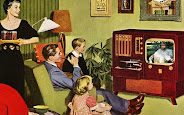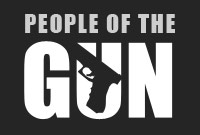But less common isn't always what you get. Those official gun ownership numbers actually compare apples and oranges. That's because Europeans own an awful lot of guns outside the law. [More]J.D. Tuccille argues we're not getting the total picture on European gun ownership.
I have concerns about some of the posited conclusions, though.
I'd need to see more proof that the Europeans who "own...guns outside the law" are defiant peaceable citizens who keep protection on the QT.
My instinct and stuff I've read to date indicates we may not be talking so much traditional Nigel and Pierre as much as newer arrivals with less affinity for promoting peace through strength in their host cultures. And again, my instinct is to assume a goodly number of these gun possessors are also members of a predatory underworld class.
Finally, I consider "ownership" both a legal and a moral term. Just because one is in possession of stolen property, which much of the black market in guns is based on, does not make him an "owner."
I'd love to believe there's a growing underground, as opposed to underworld, of gallant allies living in defiance of tyranny. I wish I could find some compelling evidence of that.




















5 comments:
I've been searching for a blog post I saw a little while back, but I can't find it in the time I have. But it linked a youtube video showing somebody in Europe firing two pistols, feeding flat-faced ammo, and getting frequent jams. Apparently the guns were converted to firing blanks. The video never showed the shooter's face. Some of these gun owners may have made their peace, and just want the bang or the status symbol.
I'd like to think many of them do own guns for self defense, but as the article points out, when you can go to jail for life for lethal self defense, you're going to think very carefully about doing so.
I asked there
What good are these guns? They may own them, but they can't USE them. They didn't use them to stop the government from it's "reasonable regulation" march. They can't use them without facing a harsher sentence than the criminal will get (should he remain alive)
It's an illustration of the prag position. Is it not?
I lived in Germany for almost four years, and I traveled through several European countries while I lived there.
My conclusion: Europeans, speaking generally, have neither the desire nor the will to disobey the State. Europeans truly do believe that the State is the embodiment of the popular will and, therefore, good by definition. Moreover, with the exception of a few countries with solid hunting traditions, Europeans are extremely hostile towards firearms ownership of any kind. The idea of a substantial body of Europeans willing to disobey the edicts of the State in order to maintain one or more firearms for self-defense is far-fetched.
The only group that might display such disobedience might be radical Islamists embedded within the Middle Eastern and North African communities extant throughout the EU. I'm not certain that I'd count that as a "victory" for our side, though.
Do not the Swiss require military service, long term reserve duty, with possession of the weapons by the soldiers in their homes?
I'm originally from the Netherlands (naturalized as a US citizen last year at age 36), and where the Netherlands are concerned, I'd sort of disagree with David's assessment. Illicit firearms owners in the Netherlands are likely to fall into one of two categories.
The first is (semi-)organized crime; the Russian mob, the Chinese triads, their local affiliates, and the Yugoslavs who carry out hits for both sides. While certainly an "underworld class," they do not tend to be "predatory" towards the average citizen. When they use guns, they mostly use them on other members of the criminal element (and sometimes their "service provider" associates, like lawyers, front company operators, and the like).
The second category consists of lower-income people (mostly males) who own a handgun for self-protection. Typically, these are not what you'd call upstanding citizens, and they may very well engage in some petty criminality, but they are also unlikely to use their firearms to commit crimes against regular citizens. They carry because they willingly interact with other unsavory elements of society, whom they do not trust.
In both categories, the gun possessors may be "newer arrivals" but they may just as readily be of indigenous ethnicity. Socio-economic background seems to play a larger role in gun ownership. But to a large extent, illicit gun ownership and use in the Netherlands is a matter of "red-on-red engagements"; the criminally inclined possessing and using firearms against other criminally inclined individuals.
That said, I'm basing myself on the situation prior to my emigrating to the US. In the interim, there appears to have been a marked increase in use of firearms in armed robberies, according to various police reports I've read, though this mostly robberies of institutions (banks, stores, armored cars) and not so much of individual citizens.
The aforegoing does not invalidate Tucille's piece as such, though that's partly because Tucille is not clear what his central thesis is. We can certainly plausibly argue that lower homicide rates in European countries, as well as lower gun crime rates, are not the result of restrictions on private citizens owning firearms (aka "gun control") since firearms appear to be readily available to, and widespread among, the European criminal element, with little to no regard for firearms laws.
And indeed, there have been years where the US non-gun homicide rate exceeded the total homicide rate of various western European countries, even while many of those countries had higher rates of other violent crimes (assault, robbery, rape) than the US. It seems Americans are not as violent as Europeans, but when they do get violent, they're much more likely to kill, by any means available (including means other than guns).
Clearly, there are cultural issues at work here, and the differences cannot simply be attributed to gun laws.
Post a Comment